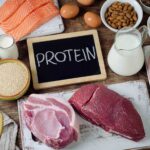Constipation, characterized by infrequent bowel movements and difficulty passing stools, is a common digestive issue that can cause discomfort and affect your daily life. While various factors can contribute to constipation, diet plays a crucial role in both preventing and relieving it. Incorporating the right foods into your meals can significantly improve bowel regularity and ease your discomfort. This article will guide you through the best Foods To Eat When Constipated to get your digestive system back on track.
Power Up with Fiber: Your Constipation-Fighting Food
Fiber, often referred to as roughage or bulk, is indigestible plant-based material that is essential for healthy digestion and regular bowel movements. It works in two key ways to combat constipation. Firstly, insoluble fiber adds bulk to your stool, which helps to stimulate the intestinal muscles and speed up the movement of waste through your digestive system. Secondly, soluble fiber absorbs water in the intestines, softening the stool and making it easier to pass.
To effectively manage constipation, adults should aim for a daily intake of 22 to 34 grams of fiber, depending on age and sex. Here are excellent sources of fiber to incorporate into your diet:
- Whole Grains: Opt for whole wheat bread, pasta, and cereals like oatmeal and bran flakes. These are packed with insoluble fiber. Consider starting your day with a bowl of oatmeal topped with fruits or switching to whole wheat bread for sandwiches.
- Legumes: Lentils, chickpeas, kidney beans, black beans, and soybeans are fantastic sources of both soluble and insoluble fiber. Add lentils to soups and stews, make a hearty bean chili, or enjoy hummus with vegetable sticks.
- Fruits: Many fruits are rich in fiber, especially when you eat the skin. Berries (strawberries, raspberries, blueberries), apples, pears, and oranges are excellent choices. Enjoy a whole apple as a snack, add berries to your breakfast cereal, or make a fruit salad.
- Vegetables: Carrots, broccoli, green peas, and leafy greens like collard greens are fiber-rich vegetables that can aid digestion. Include a variety of vegetables in your lunch and dinner, such as a side of steamed broccoli or a carrot and pea stir-fry.
- Nuts and Seeds: Almonds, peanuts, pecans, chia seeds, and flaxseeds are not only healthy snacks but also good sources of fiber. Sprinkle chia seeds on your yogurt, add almonds to your salad, or enjoy a handful of mixed nuts as a snack.
It’s important to increase your fiber intake gradually to avoid gas and bloating. Consulting a dietitian or healthcare professional can help you create a personalized meal plan with the right amount of fiber for your needs.
Hydration is Key: Drink Your Way to Regularity
Water plays a vital role in alleviating constipation, especially when you are increasing your fiber intake. Liquids help soluble fiber absorb water and soften the stool, making it easier to pass through the bowel. Staying adequately hydrated is crucial for overall health and digestive regularity.
Besides plain water, other fluids can contribute to your daily hydration and help with constipation:
- Naturally Sweetened Fruit and Vegetable Juices: Choose juices that are 100% fruit or vegetable juice without added sugars. Prune juice, in particular, is well-known for its natural laxative effect.
- Clear Soups and Broths: These are hydrating and easy to digest. Chicken noodle soup or vegetable broth can be soothing and beneficial when you’re constipated.
- Herbal Teas: Warm herbal teas can also contribute to your fluid intake and may have additional soothing properties for the digestive system.
The amount of liquid you need daily varies depending on factors like your size, health, activity level, and climate. Consulting a healthcare professional can provide personalized recommendations for your fluid intake.
Foods to Avoid: What Not to Eat When Constipated
While focusing on fiber-rich foods and hydration is essential, it’s equally important to limit or avoid foods that can worsen constipation. These are typically foods low in fiber and high in processed ingredients:
- Chips and Snack Foods: These are often low in fiber and high in unhealthy fats, which can slow down digestion.
- Fast Food: Typically low in fiber and high in fat and processed ingredients, fast food meals can contribute to constipation.
- Meat: Especially red meat, is low in fiber and can be harder to digest for some people, potentially contributing to constipation.
- Prepared and Frozen Meals: Many of these are processed and low in fiber, lacking the necessary components to promote bowel regularity.
- Processed Foods: Hot dogs, sausages, and many microwavable dinners are examples of processed foods that are generally low in fiber and can exacerbate constipation.
By understanding which foods to embrace and which to avoid, you can take significant steps towards managing and preventing constipation through dietary adjustments. Remember that consistent dietary changes, along with adequate hydration, are key to long-term digestive health. If constipation persists, it is always advisable to consult with a healthcare professional to rule out any underlying medical conditions and receive personalized advice.
